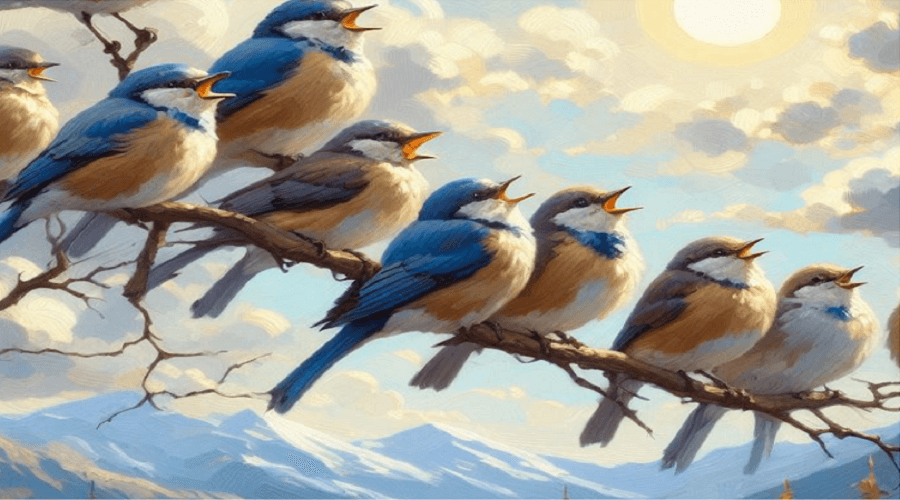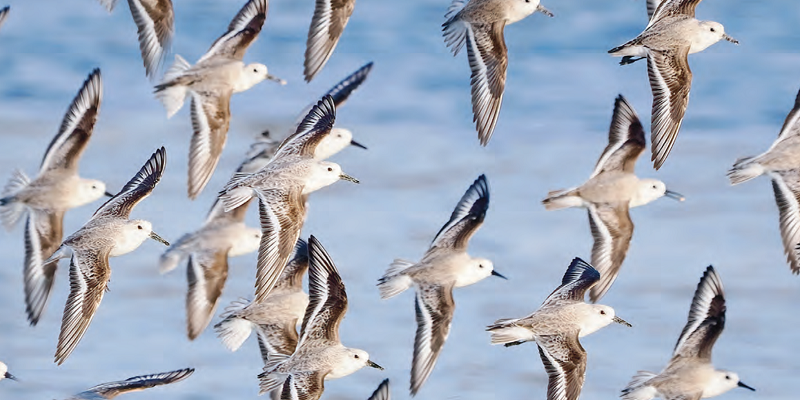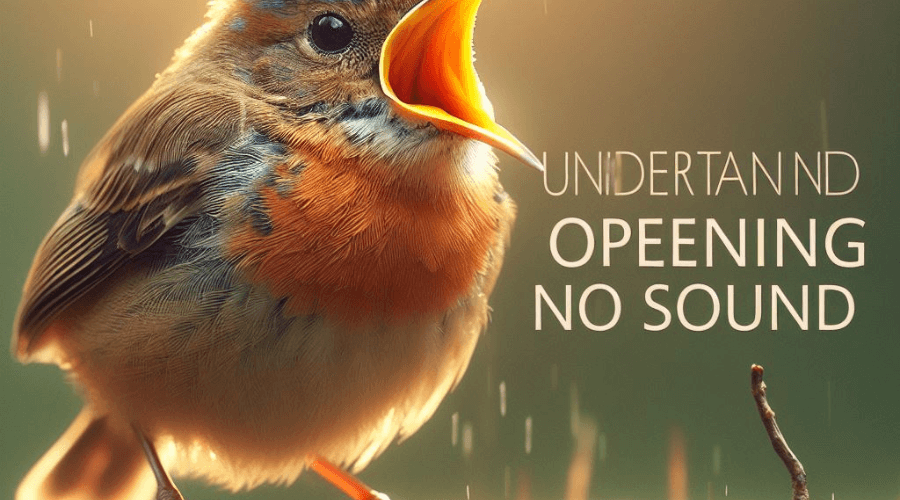Why Do Birds Sing?
Birdsong is like a secret code between our feathered friends. Imagine birds talking to each other without saying a word! It’s not just a random melody; there’s a fascinating story behind why birds sing.
Evolution of Birdsong
Birds didn’t always sing for the same reasons. Long ago, when dinosaurs roamed the Earth, birds developed their special tunes as a way to communicate. It helped them stay connected, share information, and warn about dangers.
Role in Communication
Birdsong is their language. They use it to chat with their bird buddies, tell stories, and even flirt during courtship. It’s like a musical text message that helps them express their feelings and keep in touch with their bird community.
Environmental Influences
The environment also plays a big part in their songs. Birds might sing differently depending on where they live – in the forest, near the ocean, or high up in the mountains. It’s like their way of adapting to the world around them and making sure their message is heard loud and clear.
So, next time you hear a bird singing, remember, they’re not just making noise. They’re sharing stories, making friends, and keeping the ancient tradition of birdsong alive!
Bird Courtship Melodies Unveiled
Birds aren’t just singing for fun; sometimes, it’s all about love! Imagine using a song to tell someone, “You’re special to me.” Well, birds do it too, and their courtship melodies are like romantic love letters in the air.
Importance of Courtship Songs
When birds are looking for a special someone, they sing unique and beautiful songs. It’s like a musical declaration saying, “I’m here, and I’m looking for love.” These courtship melodies help birds find their perfect match and build a happy bird family.
Variations Across Species
Just like humans speak different languages, birds have their own love dialects. Each bird species has its special song, making it easier for them to find a partner who understands their unique tune. It’s like a dating app, but with melodies!
Song and Mate Selection
Believe it or not, the way a bird sings can determine if they get a date! Some birds prefer a specific rhythm or tone, and if they like what they hear, they might decide to start a family together. It’s a bird’s way of saying, “You and me, let’s make beautiful bird music together!”
So, the next time you hear a bird singing a lovely tune, they might just be looking for their perfect feathered match!
Decoding the Dawn Chorus Phenomenon
Have you ever woken up early and heard the world come alive with bird songs? It’s like a natural concert called the dawn chorus, and it’s filled with magic and mystery.
Science Behind Dawn Choruses
The dawn chorus is like a big, happy “Good morning!” from the birds. They sing together at sunrise because it’s the best time to be heard. The air is calm, and there’s less noise, making it a perfect moment for their melodies to travel far and wide.
Species Participation
Not all birds join the dawn chorus party, but many do. It’s like a community event where birds come together to sing, creating a symphony of sounds. Each species has its role, contributing to the beautiful harmony of the early morning.
Choruses in Different Habitats
Whether in a forest, near a lake, or even in your backyard, the dawn chorus happens everywhere. Different habitats bring different sounds. Birds adapt their songs to fit their surroundings, creating a unique and breathtaking experience each morning.
So, when you wake up to the sweet sounds of birds at sunrise, you’re not just hearing random tunes. You’re part of the enchanting dawn chorus, where nature puts on a spectacular show just for you!
Feathered Composers: Establishing Territory Through Song
Did you know that birds use their songs not just to sing, but also to claim their own space? It’s like having a musical fence around their home, and it’s all about showing who’s the boss.
Significance of Territorial Behavior
Imagine having your own room that you love and want to protect. Birds feel the same way about their space. They use their songs to say, “This is my home, and I’m in charge here!” It helps them keep other birds away and ensures they have enough food and safety.
How Birds Define Territory
Birds are smart. They mark their territory by singing specific songs that say, “This area is taken!” It’s like putting up a ‘No Trespassing’ sign in their own special way. These musical boundaries help prevent conflicts and keep the peace in the bird neighborhood.
Variations Among Species
Just like humans have different ways of expressing themselves, birds have their unique territorial tunes. Some sing loudly to claim a vast territory, while others may have a more subtle melody for a smaller space. It’s their way of saying, “This is my place, and I’m proud of it!”
So, the next time you hear a bird singing its heart out, it might be not just a song but a powerful declaration of ownership over its feathered kingdom!
Communication Beyond Words in Birdsong
Did you know that birds have their own secret language? It’s not with words, but with beautiful melodies and unique sounds. Let’s dive into the world of bird communication!
Alarm Calls and Warning
Birds are like nature’s security alarms. When they sense danger, they use sharp and distinct calls to warn others. It’s their way of saying, “Watch out, there’s something not right!” These alarm calls help the whole bird community stay safe and alert.
Social Bonding through Duetting
Birds are social creatures, and they express their friendships through duets. Some bird pairs sing together, creating harmonious tunes. It’s like having a musical conversation, strengthening their bonds and showing they’re there for each other.
Complexity of Birdsong Communication
Birds are incredible communicators. They use different pitches, rhythms, and tones to express various emotions. From happiness to excitement, and even sorrow, birds can convey a range of feelings through their songs. It’s like having a whole orchestra of emotions in the treetops!
So, the next time you hear birds singing, remember they’re not just making music; they’re talking, warning, and sharing their feelings in their own beautiful way!
Imitating Maestros: The Art of Avian Impersonation
Did you know that some birds are like the mimicry maestros of the animal kingdom? They can imitate the sounds around them, creating a symphony of sounds that can surprise and amaze us.
Birds Known for Mimicry
Meet the mimicry experts! Birds like the lyrebird, mockingbird, and parrot are famous for their ability to copy sounds. From car alarms to other bird songs, these feathered impersonators can imitate almost anything they hear in their environment.
Purpose and Functions
Birds don’t mimic just for fun; they have reasons! Some use mimicry to attract a mate, while others do it for self-defense. Imagine a bird imitating a predator to scare it away – it’s like having a natural disguise to stay safe in the wild!
Cognitive Abilities
Mimicking sounds isn’t easy, but these birds are smart cookies. Their brains are wired to process and recreate a wide range of sounds. It’s like having a built-in music player in their heads that lets them play back the sounds of their surroundings.
So, when you hear a bird imitating different sounds, know that it’s not just a feathered copycat but a talented avian artist creating its unique masterpiece!
Nature’s Playlist: Diversity in Birdsong
Ever noticed that different birds sing different songs? It’s like nature’s playlist with each bird having its unique tune. Let’s explore the diverse melodies in the world of bird music!
Unique Songs of Nocturnal Birds
When the night falls, some birds take the stage. Nocturnal birds like owls have haunting melodies that pierce through the darkness. Their unique tunes are designed for the nighttime, creating an enchanting atmosphere in the moonlit hours.
Regional Variations
Just as people speak with different accents, birds sing with regional variations. A song in the city might sound different from a song in the countryside. It’s like each bird community has its dialect, making their songs a reflection of their environment.
Vocal Adaptations
Birds are like musical chameleons; they can adapt their songs based on where they live. In a forest, their songs might be different from those in a desert. It’s their way of blending in with the sounds of their surroundings and making their music fit the rhythm of nature.
So, the next time you’re outdoors, listen closely to the bird melodies around you – you’ll discover a rich and diverse playlist in the great symphony of nature!
The Science Behind Birdsong
Birdsong is not just beautiful; it’s also a fascinating science! Let’s take a peek into the amazing world of how birds produce, learn, and adapt their melodies, like little scientists of the sky.
Physiology of Birdsong
Birds have a built-in music instrument – their syrinx. It’s a special voice box unique to birds, allowing them to create a variety of sounds. Understanding the science of how the syrinx works gives us insights into the complexity of their songs.
Neural Mechanisms
Birds are brainy musicians. Their brains control the song production, and they even learn new tunes. Studying the neural mechanisms behind bird song can tell us a lot about how their brains work and how they remember and modify their melodies.
Environmental Factors
Birds are influenced by their surroundings. The environment plays a role in shaping their songs. Factors like temperature, humidity, and even the presence of other birds can affect their musical choices. It’s like birds adapting their playlist to fit the mood of their surroundings.
So, the next time you’re enchanted by a bird’s song, remember, it’s not just music; it’s a scientific masterpiece orchestrated by the birds themselves!
Urban Symphony: How City Life Affects Avian Vocalizations
Birds in the city have a different story to tell with their songs. Let’s explore how urban life influences the tunes of our feathered friends and the unique challenges they face in the bustling cityscape.
Behavioral Changes in Urbanized Birds
Living in the city changes the way birds behave. They might sing louder or at different times to compete with city noises. Some even adjust their songs to be heard over traffic and other urban sounds. It’s like adapting their melodies to the city rhythm.
Urban Noise and Adaptations
City life can be noisy, with cars honking and people talking. Birds need to be heard, so they modify their songs to cut through the urban cacophony. It’s their way of saying, “Hey, I’m here!” amidst the hustle and bustle of the city.
Impact on Birdsong Diversity
In cities, birds might face challenges finding quiet spots to sing or even mates that can hear them. This can affect the variety of songs we hear. Exploring how urbanization impacts bird communication helps us understand the resilience and adaptability of our avian neighbors.
So, the next time you’re in the city and hear a bird singing, remember it’s not just a melody; it’s a unique adaptation to the urban symphony!
Conservation Serenades: Birdsongs in Biodiversity
Birds play a vital role in our world, and their songs are not just beautiful; they’re essential for maintaining a healthy balance in nature. Let’s dive into the melody of conservation and understand why preserving birdsongs is crucial.
Role of Birds in Ecosystems
Birds are like nature’s superheroes. They help control insect populations, pollinate plants, and even disperse seeds. Their songs are a part of these ecosystem services, contributing to the overall health of our environment. Understanding their role helps us appreciate the importance of preserving their habitats.
Threats and Conservation
Birds face challenges like habitat loss and climate change, affecting their ability to sing and thrive. Conservation efforts aim to protect their homes, create safe spaces, and address these threats. By understanding the risks, we can work together to ensure a harmonious future for birds and their songs.
Citizen Science and Monitoring
People like you and me can make a difference! Citizen science programs encourage birdwatching and recording bird songs. This data helps scientists understand bird populations and their behaviors. It’s like joining a global orchestra where everyone plays a part in preserving the symphony of birdsongs.
So, the next time you hear a bird singing, remember it’s not just a melody in the air; it’s a call for us to protect the wonderful world of birds and the biodiversity they bring to our planet!













